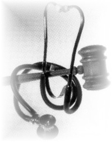Impending changes to legal education
 While Portugal and Iceland garner headlines for their international financial woes, Ireland is getting on with implementing the terms of last November’s EU IMF Programme of Financial Support for Ireland. For readers of this blog, one very important element of that programme requires the removal of restrictions to competition in sheltered sectors, such as the legal and medical professions. In particular, the Programme recommends the implementation of the 2005 Report (pdf) of the Legal Costs Working Group and of the Competition Authority‘s 2006 Reports on regulated professions, including their Report on the Legal Professions. Unsurprisingly, the Bar Council professed itself unhappy with the IMF proposals; but, in my view, the implementation of these recommendations can change the Irish legal system for the better.
While Portugal and Iceland garner headlines for their international financial woes, Ireland is getting on with implementing the terms of last November’s EU IMF Programme of Financial Support for Ireland. For readers of this blog, one very important element of that programme requires the removal of restrictions to competition in sheltered sectors, such as the legal and medical professions. In particular, the Programme recommends the implementation of the 2005 Report (pdf) of the Legal Costs Working Group and of the Competition Authority‘s 2006 Reports on regulated professions, including their Report on the Legal Professions. Unsurprisingly, the Bar Council professed itself unhappy with the IMF proposals; but, in my view, the implementation of these recommendations can change the Irish legal system for the better.
In January of this year, the Public Accounts Committee published their Third Interim Report on the Procurement of Legal Services by Public Bodies (pdf). Starting from the premise that public bodies procure huge amounts of legal services every year, the Report concluded that the ability to get value for money is restricted by the practices of the legal profession. Indeed, the Committee was very concerned that the two Reports mentioned above had not been implemented:
…The Committee notes the restrictive practices that are keeping legal fees artificially high.

 Following on from my post on
Following on from my post on 
